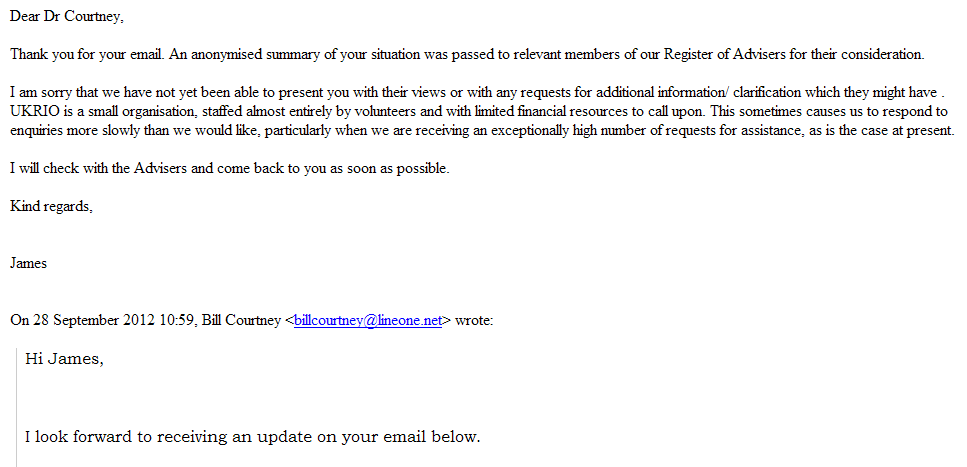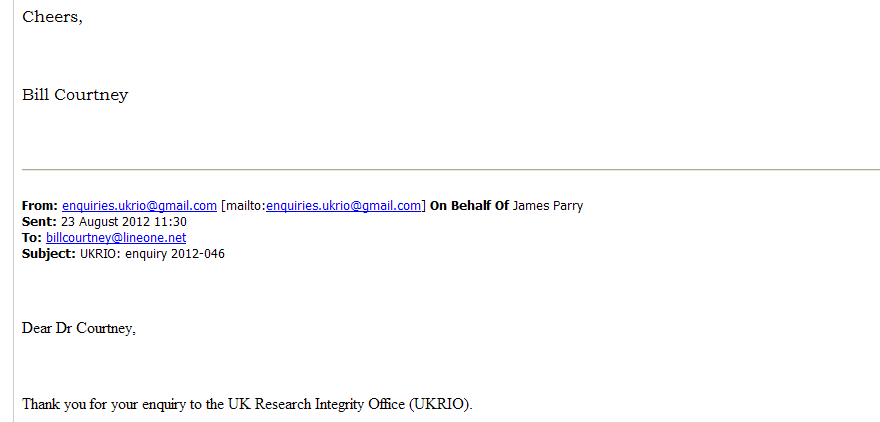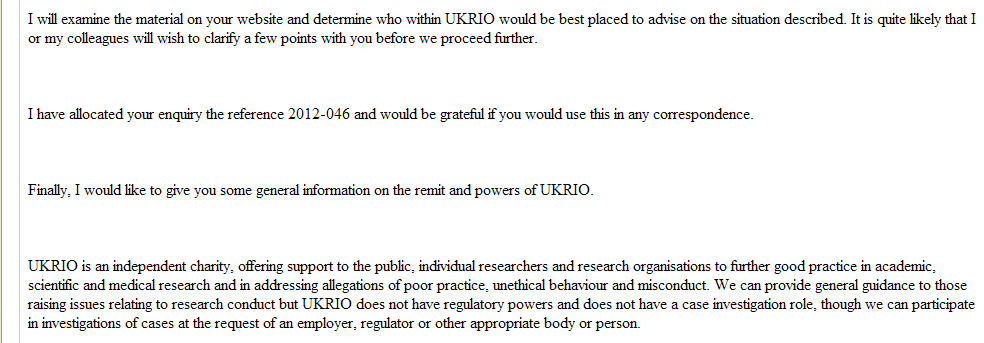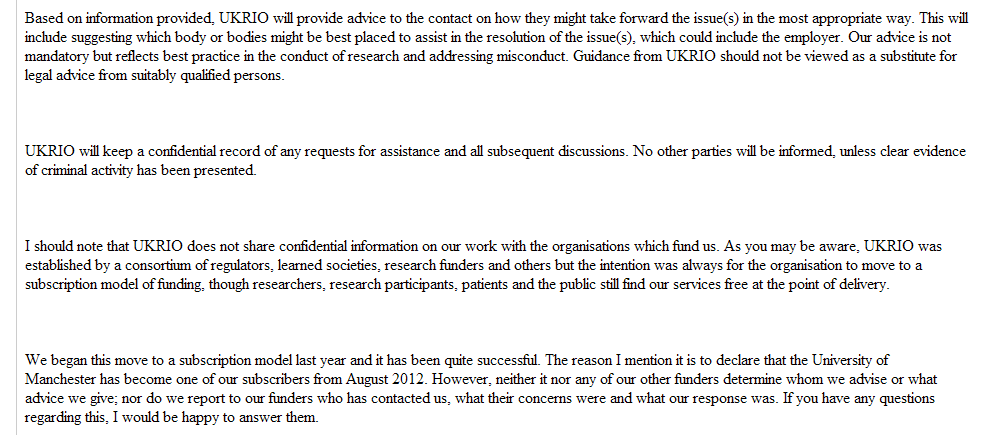
The UK Research Integrity Office remains in denial of its own role in hiding research fraud
This page includes a bitmapped version of Mr Courtney's correspondence with the UK Research Integrity Office (UKRIO).
It provides proof that the UKRIO was impotent or indifferent when challenged on a matter of Formal Enquiry Panel fraud.
This should worry all honest researchers and European pedestrians because:
(i) the panel included Dr Pablo Fernandez, a Board Member from the UKRIO .
(ii) When the EU Commission abandoned its pedestrian friendly bumper requirements, it proposed reintroducing the legislation, to become effective from 2012, if a suitable soft bumper design became available. By wriggling out of of examining evidence of research fraud, the panel denied European pedestrians a second chance of soft bumper protection.
(iii) The case for shared guilt against the panel is reinforced by their refusal to examine good SALi research done at Cardiff University, with the 2012 deadline in mind.
A coy of the following paper describing good SALi research relating to soft car bumpers was submitted to the panel, but is not referred to in their report.
Huw Davies et.
al., Cardiff University School of Engineering, Pedestrian Protection using a
Shock Absorbing Liquid (SALi) based Bumper System,
ESV Conference, Stuttgart,
June 2009, Paper Number 09-002.
Why this matters
Shortly after the formal enquiry cleared the Manchester researchers of
defrauding the EPSRC, Cardiff University's application for EPSRC funding to do the soft
bumper research correctly was refused.
Would this have happened if the panel had been honest?
How many European pedestrians are destined to be crippled for life as a consequence?
Bill Courtney asserts that,
The first duty of a Research Integrity Office should be to defend the integrity of science.
Representatives sitting on Formal Enquiry Panels should not be giving false credibility to corrupt enquiries by adding their name to fraudulent enquiry findings.
Here is the evidence that Bill alerted the UK Research Integrity Office to the problem.
You can verify its authenticity by contacting the Office directly using this link: http://www.ukrio.org/get-advice-from-ukrio/






= = = = = = = = = = = = = = = = = = = = = = = = = = = = = = = = = =
Getting the Formal Enquiry fraud into perspective
The pessimistic reader should not be tempted in to thinking that all formal enquiry panels are corrupt.
There are unusual circumstances relating to this case that made secondary fraud exceptionally tempting to the panel.
(i The original research fraud was very embarrassing for British science because it affected a European road safety directive. It may have cost European pedestrians their lives and led to many more being crippled for life.
(ii) This is unfortunate for the pedestrians concerned. But a more direct consequence for British universities is that exposure of the fraud may have affected their lucrative EU funding.
(iii) Prior to the Formal Enquiry, Manchester University had spent several years trying to hide the fraud. If the Enquiry Panel had acknowledged this cover-up it could have been used as evidence by injured European pedestrians seeking compensation from the University for its negligence.
(iv) The University concerned was exceptionally ambitious in its desire to become one of the worlds top twenty five research institutions.
(v) At the time of the formal enquiry, Manchester University was on the verge of Nobel glory. An open and honest Formal Enquiry Report would have been unhelpful.
(vi) The chair of the Formal Enquiry Panel was in a very difficult and unenviable position because she was also collaborating with the two eventual Nobel Prize winners.
http://www.physics.leeds.ac.uk/index.php?id=263&uid=1402
What Bill Courtney has learned from his experience
The modern British research establishment appears to be more concerned with protecting its public image than acting ethically.1
This tarnishes our scientific heritage, bequeathed to us by great British researchers such as Newton, Darwin, Turing, Hodgkin and Franklin.
A volunteer UK Research Integrity Office that prefers to hide the truth will do more harm than good for British science.
We need a fearless and scrupulously ethical national research watchdog that will not rely on volunteers cherry picking easy cases.
Based on his experience, Bill makes a number of proposals for reform on his Science under attack web page.
The wider consequences for
Bill Courtney as an inventor
It is twenty nine years since Bill invented Shock Absorbing Liquid (SALi). Since then he has spent his £140,000 retirement savings and many thousands of hours striving to develop SALi for the public good. The UK taxpayer has also contributed £290,000 to help in this work. However, thanks to the misbehaviour of a tiny handful of people, nobody has benefited from it.
Bill has also lost a potential royalty income of several million Pounds that he intended to reinvest in other inventions to save lives. The most serious investment loss of all relates to his Latent Power Turbines2. These could make a significant contribution to fighting climate change.
British science should not be judged by one bad example
In the twenty nine years since Bill invented
SALi Technology,
science, medicine and technology have made great advances. British researchers
have punched well above their weight in helping to make this happen. We
Brits should be proud of this.
Bill certainly is!
The SALi scandal is shameful, but the UK government is still acting wisely when it invests our money in great British science.
1Bill appealed to the following representatives of the establishment for assistance, all without success.
The EPSRC, Universities UK, The UK Research Integrity Office, The Royal Society, The Campaign for Science and Engineering, the Council for the Defence of British Universities, the UoM Institute for Science, Ethics and Innovation, the Science Minister (Lord Sainsbury, via his MP). He has also written to science magazines, journals and newspaper science editors whenever they have made reference to the problem of science research fraud.2 Back in 2001, Bill hawked his embryonic LP Turbine, which took the form of a Parallel Stirling Cryocooler, round the physics and engineering departments at Manchester University. Quite understandably, nobody was interested in working with him until he could make a personal financial contribution to the project. This chance never came.
He did apply to The Joule Centre at Manchester University for funding, but his bid was rejected. There was a delay of twelve years before he finally obtained TSB/EPSRC funding to build a prototype LP Turbine. Meanwhile, climate change has made its mark.
INTERNAL LINKS
The PedSALi project page. Academic jealousy relating to this project triggered the most serious SALi research fraud.
What is SALi? Go to Section Six of this web page for a history of SALi and comprehensive details of the SALi shenanigans at Manchester University UK.